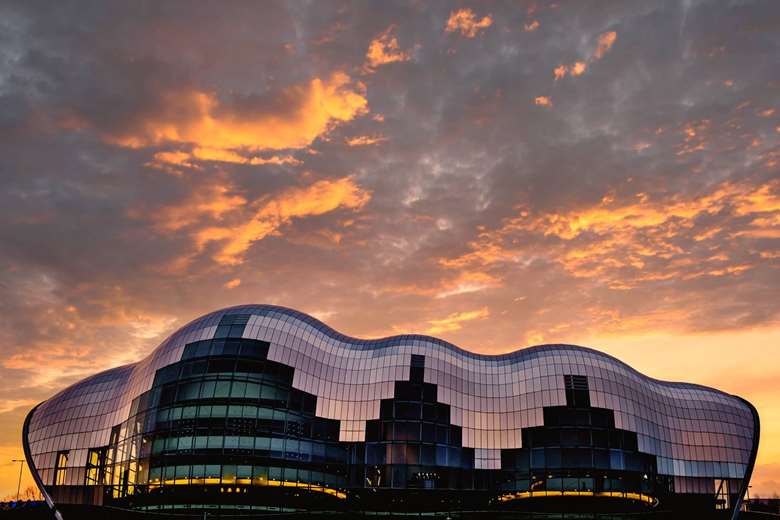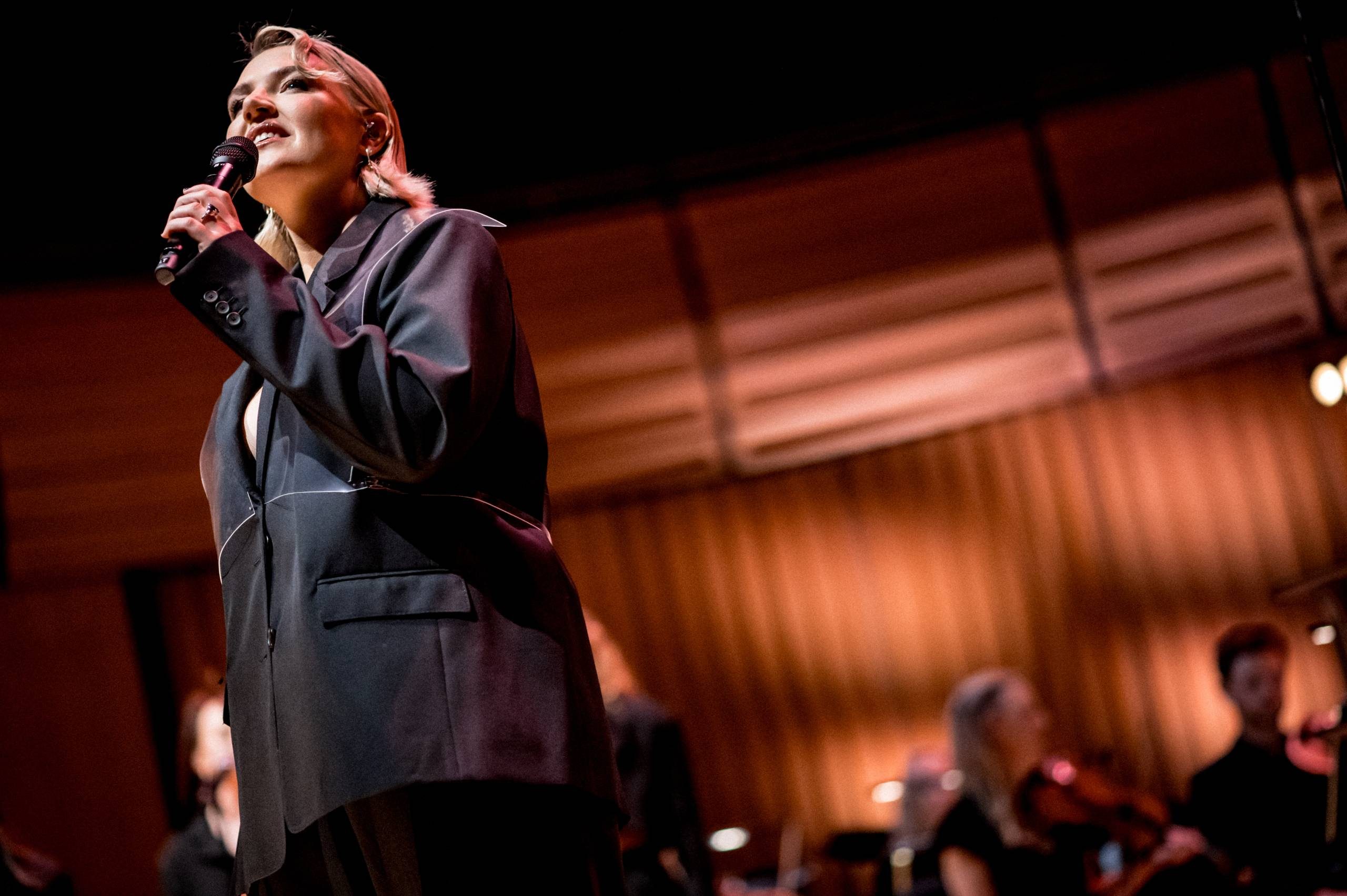Two decades of the Glasshouse International Centre for Music
Nick Smurthwaite
Tuesday, December 17, 2024
As the newly renamed Gateshead venue turns 20 years old today, Nick Smurthwaite looks back at its inclusive founding principles, and hears from the Glasshouse team about their plans for the future

In its first 20 years, the recently renamed Glasshouse International Centre for Music – formerly known as the Sage – has not only proved a magnet for world class musicians but also brought about much-needed regeneration of the Tyneside town of Gateshead.
Norman Foster’s great, gleaming seashell of a building rivals Anthony Gormley’s Angel of the North and the award-winning Millenium Bridge, linking Gateshead with Newcastle, as one of the must-see glories of Tyne and Wear. Inspired by Vienna’s Musikverein, Foster boldly wrapped a curved glass and steel blanket around a 1,700-seat concert hall – home of the Royal Northern Sinfonia – as well as two smaller performance spaces. The three adjacent venues are insulated from one another to prevent unwanted noise and vibration.
 A northern staple: The Glasshouse occupies a prime spot on the banks of the River Tyne ©David Tiernan
A northern staple: The Glasshouse occupies a prime spot on the banks of the River Tyne ©David Tiernan
From the start, the Glasshouse was intended to be inclusive, both in terms of its usage and the kind of music on offer, from Hip-hop to Handel. ‘The scale of the ambition was enormous,’ says managing director Alison Pogson, who ran Spitalfields Music for seven years prior to her appointment in 2015. ‘It was a ground-breaking concept, both in the way it was set up, its activity and the design of the building. The idea of excellence, inclusion, education and participation being hard-wired into everything we did was unique at the time.’
Regeneration of the area was always an important factor for the community, explains Pogson: ‘Coming up to the millennium, the local authority here in Gateshead clocked that you could use culture as a trigger to reach a wider set of targets around regeneration, in relation to social mobility, economic development, identity, health and wellbeing, all of those things. What we’re looking at ultimately is a kind of mini South Bank.’
 The venue's foyer is deisgned as ‘a kind of indoor town square' to cater to the social needs of the community ©Mark Savage
The venue's foyer is deisgned as ‘a kind of indoor town square' to cater to the social needs of the community ©Mark Savage
In addition to lottery funding of £47 million (the largest amount ever awarded outside London at the time) there was a consortium of donors and stakeholders in the North East who really wanted to make it happen. Its gestation period was about five years. Now its configuration and ethos are internationally regarded as a blueprint for similar inclusive music centres.
Architect Norman Foster said at the time it opened that the Sage, as it then was, should not only ‘contribute to the urban regeneration of Gateshead and symbolise the cultural emergence of Tyneside, but also provide an urban living room in which the local community can enjoy a wide range of music.’ In other words, the venue was to be a community hub, open from eight in the morning until 11 at night, where people could meet socially over a coffee or a glass of wine, regardless of whether or not they were there to listen to music or participate in some musical event. What we’d normally call a foyer in any other venue is here an enormous concourse – ‘a kind of indoor town square.’ says Pogson – spilling out on to two adjacent squares.
 The essence of versatility: The Glasshouse's central auditorium is acoustically flexible and home to the Royal Northern Sinfonia ©Tynesight Photographic Services
The essence of versatility: The Glasshouse's central auditorium is acoustically flexible and home to the Royal Northern Sinfonia ©Tynesight Photographic Services
The main 1,700-seat auditorium, where the Royal Northern Sinfonia (RNS) performs, was intended to be an acoustically perfect space, modelled on the Musikverein in Vienna. Its ceiling panels may be raised and lowered and curtains drawn across the ribbed wooden side walls, changing the sound profile of the room to suit any kind of music.
Dinis Sousa, the dynamic young Portuguese musician who took over as principal conductor of the RNS in 2021, welcomes the informality of The Glasshouse. He says, ‘It’s not imposing like a concert hall, it feels more like an extension of people’s houses. It is welcoming and friendly. From the musicians’ point of view, there is a strong sense of the audience being like a family.’ In November, kicking off the venue’s 20th anniversary programme, Sousa took on one of his biggest challenges yet, conducting Tippett’s wartime oratorio, A Child of Our Time, involving the Sinfonia and Chorus; Voices of the Rivers’ Edge, a 50-strong amateur choir attached to the Glasshouse (pictured below); and soloists Willard White, Sarah Connolly, Nicky Spence and Masabane Cecilia Rangwanasha.
According to the Edinburgh Music Review, after noting that many of the non-professional choir did not read music, the concert was ‘not just a high-quality musical account, but something deeply felt and understood, a first-rate example of community music making.’

 ©Tynesight Photographic Services
©Tynesight Photographic Services
Director of the Royal Northern Sinfonia and classical programming James Thomas was impressed by ‘the depth of connection between the Sinfonia’s musicians and its community’ when he joined The Glasshouse in 2022. He says, ‘There is definitely an appetite for what the orchestra does across all age groups. Younger people under 30 often make up about a quarter of the audience for our classical season.’
Heading up the contemporary music and the creative learning side of the Glasshouse remit is former recording artist Wendy Smith, who made her name in the 1980s band, Prefab Sprout. She and James Thomas work together on large scale creative projects, such as the BBC Proms, which have been broadcasting from the Glasshouse for three consecutive years. When the venue’s ‘satellite’ prom events were first launched, it was the first time the Proms had ventured outside London.
 Prom perfection: The venue was the first to host the Proms outside London ©Tynesight Photographic Services
Prom perfection: The venue was the first to host the Proms outside London ©Tynesight Photographic Services
She says, ‘Hosting the Proms has made a huge difference to our profile, and it enables us to do things we might not otherwise be able to do. Last year, we welcomed the jazz musician Jordan Rakai, and in a previous concert (award-winning singer) Self Esteem performed with the Royal Northern Sinfonia. The concert sold out in an hour.’
Looking ahead to its third decade, the Glasshouse will be developing its Music Academy encompassing all their music education and artist development, made possible due to a £2m donation from the Foyle Foundation. They have also launched the Music Pass, giving every new-born in the region free access to the venue for the first 10 years on their life. ‘We want them to know we’re part of their lives,’ says Abigail Pogson. It is part of the venue’s commitment to be ‘the most affordable music centre in Europe’ as well as the most accessible.
To sustain all this, the Glasshouse is launching an ambitious £20 million fund-raising campaign in 2025 to help maintain the building and secure the venue’s future – and, in large part, the future of arts engagement in the region – for the decades to come.



